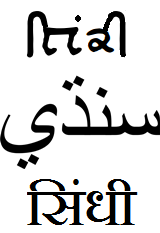Language/Sindhi/Grammar/Nouns-and-Pronouns
Introduction
In the Sindhi language, nouns and pronouns play a crucial role in sentence formation. Nouns are words that name people, places, things, or ideas. Pronouns, on the other hand, are words that replace nouns or other pronouns in a sentence. In this lesson, we will explore the different types of nouns and pronouns in Sindhi and learn how to use them in sentences.
Nouns
In Sindhi, nouns can be classified into five different types: common nouns, proper nouns, collective nouns, abstract nouns, and compound nouns.
Common Nouns
Common nouns are words that name people, places, things, or ideas in general.
Examples:
| Sindhi | Pronunciation | English |
|---|---|---|
| کتاب | kitaab | book |
| بچو | bacho | child |
| شہر | shahar | city |
Proper Nouns
Proper nouns are words that name specific people, places, things, or ideas.
Examples:
| Sindhi | Pronunciation | English |
|---|---|---|
| اسلام آباد | Islam-aabaad | Islamabad |
| خضرآباد | Khizar-aabaad | Khizarabad |
| سُناري | Sunaari | Sunari |
Collective Nouns
Collective nouns are words that name groups composed of more than one individual.
Examples:
| Sindhi | Pronunciation | English |
|---|---|---|
| ڪلاس | klas | class |
| جماعت | jamat | congregation |
| جنگھيا | Jungia | herd |
Abstract Nouns
Abstract nouns are words that name ideas, concepts, or emotions.
Examples:
| Sindhi | Pronunciation | English |
|---|---|---|
| خوشي | khushi | happiness |
| وفاقت | wafaqat | unity |
| شفقت | shafqat | compassion |
Compound Nouns
Compound nouns are words that are composed of more than one word to convey a single idea.
Examples:
| Sindhi | Pronunciation | English |
|---|---|---|
| جدي دڪيا | judi dakkya | alarm clock |
| پيٺو جو عرس | paitu jo urs | wedding banquet |
| روٽي جي گت | roti ji git | bread song |
Pronouns
Pronouns in Sindhi serve as substitutes for nouns, making sentences more concise and avoiding repetitive use of nouns. Pronouns can be classified into five types: personal pronouns, demonstrative pronouns, interrogative pronouns, indefinite pronouns, and relative pronouns.
Personal Pronouns
Personal pronouns in Sindhi change according to their grammatical role in the sentence. They can be subject pronouns, object pronouns, or possessive pronouns.
| Person | Sindhi | Subject Pronouns | Object Pronouns | Possessive Adjectives | Possessive Pronouns |
|---|---|---|---|---|---|
| First Person Singular | مانِ | mane | مونِ | منهُنجو | منهُنجي |
| Second Person Singular | توهان | tohan | تونِ | توهانجو | توهانجي |
| Third Person Singular Masculine | هي | hi | هنِ | هيچونجو | هيچونجي |
| Third Person Singular Feminine | تهِ | tihe | تِنِ | تهينجو | تهينجي |
| First Person Plural | عاها | aaha | عاهنِ | عاهنجو | عاهنجي |
| Second Person Plural | تونجهِ | tounjehe | تونجينِ | توهانجونجو | توهانجونجي |
| Third Person Plural | هن | hen | هنِنھي | هنجو | هنجي |
Demonstrative Pronouns
Demonstrative pronouns are used to point to specific people, places, or things.
Examples:
| Sindhi | Pronunciation | English |
|---|---|---|
| هڪري | hikri | this |
| هُو | hu | that |
| چو | cho | those |
Interrogative Pronouns
Interrogative pronouns are used to ask questions.
Examples:
| Sindhi | Pronunciation | English |
|---|---|---|
| ڇا | chaa | what |
| ٻڌن | bheyna | who |
| ڪيا | kya | which |
Indefinite Pronouns
Indefinite pronouns refer to a non-specific person, place, or thing.
Examples:
| Sindhi | Pronunciation | English |
|---|---|---|
| ڪو | ko | someone |
| ڪاڻِن | kanin | anyone |
| ڇن | chun | anything |
Relative Pronouns
Relative pronouns are used to connect a clause or phrase to a noun or pronoun.
Examples:
| Sindhi | Pronunciation | English |
|---|---|---|
| ڇوُ | choo | who/that/which |
| جي | ji | whose |
| اَڄُ | achoo | that |
Conclusion
In this lesson, we explored the different types of nouns and pronouns in Sindhi and learned how to use them in sentences. With this knowledge, you'll be able to express yourself more effectively in Sindhi and create more complex sentences. Keep practicing and building your vocabulary for continued success in your learning journey!
Other Lessons
- Adjectives and Adverbs
- Adjectives
- Relative Clauses
- Expressing Possession
- Subjunctive Mood
- Pronouns
- Questions
- Imperatives
- Comparatives and Superlatives
- Plurals
Sources

